- Home
- Taylor Caldwell
Wicked Angel Page 5
Wicked Angel Read online
Page 5
“Oh, animals are so germy, so dirty!” Kathy had protested. “You know how they soil things, and cover everything with hair, and track mud. What do you mean, ‘company,’ Mark? He has me—I mean us. He doesn’t want anything else.”
“Why don’t we ask him, and let him make up his own mind, Kathy?”
“I wish you wouldn’t call him Bruce,” said Kathy petulantly. “It’s such a rough name. Angel he’s always been to me, and Angel he always will be. All right, we’ll ask him. You can be so stubborn, Mark.”
To Kathy’s surprise and hurt, Angelo promptly declared he would like a dog. Mark would not acknowledge even to himself the immense surge of relief that filled him, or the reason for that relief. But he bought Angelo a loving and trustful young cocker spaniel of a honey color, with great brown eyes limpid as brook water. The boy shouted with pleasure, seized the dog and jumped high in the air, teeth and face gleaming, while Kathy smiled, filled with jealousy. When Angelo had become more calm, Mark talked to him seriously about the little creature.
“You see, son, Petti must rely upon you for everything. You must feed him, brush him, keep him out of danger, keep his water dish filled and clean. He is your charge, just as you are your mother’s and father’s charge. He will love you, and you must give him love in return, and train him not only to be your obedient dog but your friend. And no boy ever had a better friend than a dog.”
Angelo nodded soberly. “I know, Daddy,” he said, in his winning voice. “I’ll take good care of him.”
“I’ll help you,” said Kathy eagerly. “After all, it’s a big responsibility for a little fellow.”
“Bruce isn’t a little fellow any longer, Kathy,” said Mark, with some sternness. “He’ll be in second grade before you know it. In fact, he should be there now.”
“He knows enough to be in third grade!” exclaimed Kathy, her blue eyes sparkling with anger.
“So he does,” said Mark, and ruffled the dark red curls on Angelo’s head. Angelo endured caresses from his father with a strange stillness, and a curious glint in the hazel eyes so like Mark’s. It was impossible for Mark to know that his son despised him, that he amused Angelo with his sincerity, his simple, kindly ways, and his strictly honorable speech and motives.
“He should take an examination,” said Mark. “I wouldn’t want him to be with much older boys. I’m not in favor of the ‘age-group’ business, for people of the same age are often much older, and younger, than their ‘group.’ But Bruce never had any playmates, or close friends of his age, and older boys wouldn’t welcome him too much, if they were considerably older.”
Mark reached out to fondle Petti’s head; Angelo clutched the dog tightly and the small thing whined in discomfort. Mark brought this to Angelo’s attention, and the boy nodded obediently, and ran out of the house with his new charge. Kathy peered through the window and watched the two romp on the lawn, and her face was full of sentimentality. “I hope the dog won’t bite Angel,” she said, after a moment.
“Petti’s only a baby,” said Mark. He looked at Kathy’s profile, which was illuminated by the summer sunlight, and he thought that she was truly lovely, and, all at once, with a kind of sickness, he knew that he no longer loved her. Had he ever loved her? He could remember being charmed by her and her coaxing ways and her sweet smile, and her archness and eagerness to please him and all others. She had not only been a pretty girl, but a “good” one, in the sense that she had been a virgin at marriage. His had been a coarse world of men and war and harsh study; his mother had been a gentle and feeble little creature, very shy and quiet, and so neutral in dress and voice and manner that he had hardly considerd her a woman. He had had no other female relatives. Kathy had seemed to him the quintessence of femaleness, the very soul of femininity, with her soft voice, her coy little gestures, the way she had of tilting her head like a trusting child, her musical giggle, and her floating dresses. When had he, Mark, stopped loving her—if he had ever loved her? When his son had been born, and he had become no longer husband and lover but only the means by which she sheltered, pampered and coddled Angelo in luxury and ease? Or, had he—sickened, and yes he was sickened—of her long before that, when he had detected acid in the sweetness, lies in the smooth voice, and hypocrisy and cheap sentimentality in her words? Sometimes Mark watched the beaming affection on the faces of her friends, wondering if they knew of the spitefulness of the remarks she made about them to him, and even to others. Watching her now, he recalled that never once had she spoken to him with kindness, compassion or sympathy for anyone; calamity in the lives of her friends, grief, loss of position touched her not at all, though she was effusive in her expressions of sorrow when among the afflicted. Were the legion of her admirers and devotees as stupid as he had once been, and were they so easily deceived?
Mark felt the dryness of despair in his mouth and throat as he watched Kathy preen and peek like a young girl; she followed the movements of her son and the dog with her big blue eyes. She made a murmurous sound in her throat of passionate love. Once she clapped her hands gaily. Then, smiling, she turned to look at Mark, and the smile abruptly disappeared, and her hand flew involuntarily to her lips.
“What is it, Mark?” she cried, with real alarm. “You look so—funny.”
She was very acute; what she had seen on her husband’s face had frightened her with its starkness, its cold penetration. She thought she had detected a fierce and bitter dislike. But that was nonsense! How could she believe that of Mark, who just worshiped her, who lived only for her and their son?
“Nothing,” replied Mark, turning away, and he made a gesture as if he were covering nakedness, and was ashamed. “I’m just tired out; the weather’s been too hot for me.”
He left the room and Kathy watched him go, thoughtfully, her eyes narrowed in reflection. She was too egotistical to doubt Mark’s affection for a moment, but there was an uneasy stirring in her. She sat down where she could watch Angelo and the dog, and began to think. Mark had been strange for a long time, she remembered now. Kind, yes—sometimes tender, yes; patient, considerate, generous as always. But he had begun to have odd silences. His lovemaking was infrequent, and had been for—how long was it? A year, two years, three years? She shook her head irritably. She got up to inspect her face and hair in the long mirror in the hall, and to scrutinize her figure. It was a little dusky here, and masked the faint lines on her thirty-seven-year-old face, and the light from the door created a fiery nimbus about her auburn curls. She had never liked her throat; even in her twenties it had been somewhat wizened in appearance, and the light here, dim as it was, did not hide the hard wrinkles on it and the coarse texture. She smoothed her hands lovingly over her breasts and waist, which still appeared young; when her palms encountered the heavy buttocks and massive thighs she hastily withdrew them. The harness about them was like armor.
Had Mark guessed that she was older than he, after all these years, and was there some young girl in his office who had suddenly attracted him? No, that was ridiculous. And it was unpleasant even to contemplate. She was his wife; how could he help but adore her as others adored her? Was she not prettier, more intelligent, more interested in community activities and worthy causes, than the other women she knew, and was she not the finest of housekeepers and cooks, and was not this house the best kept of any, and did she not devote herself to her family? What else could a man want?
The uneasiness left her, and she returned to the living-room window where she could watch her beautiful son and the scampering little dog.
Mark was in his room, completing his packing. But his movements were listless, and his despair had him at the throat like a worrying beast. What could he do? Must he live out his life with Kathy? Must there be no real joy and love for him? Must he endure, for endless years, the sticky syrup of that voice? Mark sat down wearily on the edge of his bed, and looked with empty eyes around the pretty “feminine” bedroom, with its light blue walls, its white lattices which were really
not lattices at all but decoration only, its deep blue rug, its pale golden draperies, its chaise longue covered with pink silk, its ruffles and its scents. It was all as arch and foolish as Kathy, and as artificial. Mark rubbed his cheek with the knuckles of his right hand. What could he do? He was thirty-four; he might live for several decades, and always with Kathy. Unless, and now he sat up straight on the bed, he remained with her only until Bruce was about ten years older! But did not everyone say that a boy in his adolescence needed his father more than ever before? What would Kathy make of the boy, if she were alone with him? Mark’s heart yearned over his son, and the fear he had begun to feel several years ago was sharp in him. He faced that fear now, as he had refused to face it before. There was something wrong with Bruce, and he did not know what it was.
The latest maid, a kind, middle-aged woman, knocked on the door and said, “It’s me, Mamie, Mr. Saint. I brought you a drink. I thought you might need it; it’s so hot today.”
She entered, carrying a silver tray on which there was a tall frosted glass of gin and tonic embellished with slices of lemon. Mark took it from her, gratefully. He said, “Why haven’t you taken your Sunday afternoon off, Mamie?”
She regarded him with simple pity; the poor man looked so tired and drawn, and his right eyelid twitched. “Well, we’re going away in a couple of days, Mr. Saint, and there’s lots to do, and I have to help with the packing, and do my own, too.”
She was short and stout and had a motherly face. She was sixty years old, and homeless, and proud, and a widow. Kathy paid her but thirty dollars a week; she did not know that Mark gave Mamie an extra ten in order to keep her. She had been with the family only two months, but even this was longer than any other maid had remained.
“You work pretty hard here, Mamie,” said Mark, sipping at the drink. “Don’t think I don’t appreciate it, and my wife—”
She shrugged her plump shoulders. “Mr. Saint, I’ve worked hard since I was five years old. It ain’t nothing for me to work. I’ll be working until the day I die, I suppose. Work never killed anybody. Besides, Mrs. Saint works just as hard as me, around this house.” Her face changed a little.
“I hope you’ll stay with us, Mamie.”
Her deep-colored cheeks suddenly dimpled. “Don’t worry. I will. For a couple of more years, anyway, until I can get my Social Security.”
They laughed together, and then the telephone extension rang. Mark picked up the blue receiver and said, “Hello?” Mamie left the room and closed the door behind her.
The line hummed, and there was no reply. “Hello?” said Mark impatiently.
Then he heard Alice’s voice. “It’s Alice, Mark. I was just calling Kathy about something. Is she there?”
Mark heard the front door close, and then Kathy’s voice on the brilliant green lawn. “I just bought a dog for Bruce, and Kathy’s gone out to watch them play together. I’ll call her.”
There was a pause. Mark could hear the beating of his aroused heart. “Alice?” he said. “Allie?”
“I’m still here,” she said with a little, forced laugh. Then her voice became low and serious. “You say you’ve bought a dog for Bruce?”
“Yes. I thought it was time to get him one. Make him responsible for something besides himself. Every boy should have a dog. Don’t you agree?” His heart felt thick and fast and muffled in his chest, and the hand that gripped the receiver was sweating. What was the matter with him? he thought.
“Yes. Yes, of course.” Alice sounded faintly troubled. She hesitated. “Does he like the dog, Mark?”
“Crazy about him. I tell you, Allie, I was surprised myself, for you know the kid’s always had the world centered about him alone. Now he’ll begin to get a broader view of life, through the dog.”
“Yes. Yes, of course,” Alice repeated. He could hear her draw a profound breath. “You’re leaving the day after tomorrow for the cabin, aren’t you?”
“Yes.” He could see her face clearly, so clean, so womanly, so gently stern and without guile. He could see the dark blue eyes, so bright with intellect and understanding, and the abundant flaxen hair and the straight shoulders. The vision was so sharp to him that he felt he could reach out and touch the girl.
“Allie,” he said suddenly. “Why don’t you come with us this year? You haven’t been out to the cabin for three years. And you used to like it.”
“Oh, I couldn’t!” she cried, as if in distress.
“Why not?”
“I—well, I really promised someone—I thought I’d go to Boston for a week or two. Mark, will you tell Kathy I called, if she’s busy now?”
“Allie,” he said, and did not know how his voice sounded, so urgent and almost desperate. “Come with us, Allie. Kathy’s always complaining that you never accept her invitations. And it’s cool out there. Remember how you and I always took long walks in the morning? Allie? Will you come?”
Alice was silent. Something had been said, something had changed, something would never be the same again. The quiet line hummed between them. Mark could not see, but there were tears in Alice’s eyes, and she was very white, and trembling. She had heard with her inner ear, and she had heard Mark’s desperation, and she was afraid. What was wrong?
“I’ll tell you,” she said at last, speaking with an effort. “It’s only ten, fifteen miles from where I live. I’ll come out next weekend, Mark. For a couple of days. Will that be all right?”
“Yes,” he said, “it will be all right.”
He stood up. He was no longer weary or without hope. He resumed his packing, and sang under his breath, then began to whistle. When he heard his son shout and the little dog bark, and then Kathy’s laughter, he smiled. He drank the rest of his drink. He had been heavily depressed, and now the depression was gone. A man without complexities, he did not question why. When Kathy came up to the room he kissed her.
CHAPTER FOUR
“It’s really going to be a squeeze,” Kathy complained at the cabin. “There are only three bedrooms, one for us, one for Angel, and one for Mamie. When Alicia stopped coming to the cabin, and showed no more interest in it, I sold the studio couch in the living room. Now, what’ll we do? We can’t have anything delivered away out here on such short notice.”
“I’ll sleep on the sofa,” said Mark. “You and Allie can have our bedroom. After all, it’s only for two nights. I thought you’d be glad to have her come.”
“Oh, I am,” said Kathy crossly. “After all, she’s my only sister. But it does make things inconvenient, and Mamie’s been sulking since we came. No movies, no TV, no neighboring maids to gossip with, no shop windows to look in, no bingo, no soda fountains, no cronies. And so the extra work might be too much for her, and what will we do then?”
“It’s only two nights,” repeated Mark, frowning. “And Mamie likes Allie.”
“How can you say that? She’s only seen her a couple of times. Did you ask Mamie about all that devotion?”
Mark’s mouth tightened, and he stared at Kathy. “Allie never makes extra work or trouble for anybody. If I remember right, she used to help you when she came here. And she’s young—”
“And I’m old!” flared Kathy.
“Kathy. Don’t be silly. Besides, I don’t think Mamie is sulking because she misses going into the City twice a week. You’ve been burdening her too much. It isn’t necessary for Bruce to change all his clothing twice a day out here. We’re lucky we have someone like Mamie who doesn’t object to doing the washing for us between the times I carry the laundry down to the village. But don’t put too much on her. Let Bruce get a little dirty every day, and stay that way.”
“Germs!” said Kathy. “Don’t you know this is the worst season? You have to be extra careful with The Children in the summer; everything must be absolutely sanitary. You know that. All right, I won’t fuss any longer. You can sleep on that short sofa if you’re so anxious to have Alicia here.”
They looked at each other. Mark had colored darkly
, and seeing this Kathy was startled. Mark said, “Don’t be a fool. She’s your sister, not mine. If there’s going to be any more talk about this simply call her up and tell her it will be inconvenient. I’m not ‘anxious.’ But you should be. It’s damned hot in the City, and she can’t afford much in the way of a holiday.”
He went out of the luxurious cabin, and looked about the neat grounds for his son. His head was suddenly pounding, and he blinked in the sunlight. The flowers glowed on the lawns; the hollyhocks near the edges of the clearing were like pink and white flames. The woods beyond loomed in thick, dark greenness. But Angelo and the little dog were nowhere in sight.
Vaguely anxious, Mark called and whistled. There was no answer except the sound of the summer wind in the trees, and the rustle of startled wings. Mark looked up into the trees, and was pleased that there were birds there again. But it was strange how they disappeared shortly after the family arrived. Then Mark trotted to the end of the lawns and to the bluff, with its high split-log fencing. He could not keep himself from fearfully looking down the side of the steep bluff with its fanged rocks and thorny brush far below. Then he laughed aloud. If there was one place the careful Bruce would never go it was to this fence and this dangerous place. Mark stood and lighted a cigarette and looked to the far hills, which were green and gold in the hot light. There was no fishing here, no opportunity to golf, except twelve miles away beyond the village. But it was full of peace and deep forest quiet. Mark sat on the top of the fence and smoked. He felt languid and content as the sun beat down on his bare throat and arms and head. His dark skin was already several shades darker, though he had been here only three days. Here he could read all the books he had neglected during the winter months; here he could think and walk. He liked the village for all its dust and heat, and often drove down to it. He had a few friends there among the shopkeepers, and a friend or two among other refugees from the City who had homes nearby. They had children, these summer visitors, but for some reason Bruce was not invited to the other homes, nor did children come to see him.

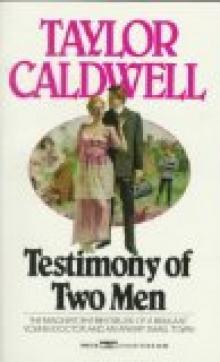 Testimony of Two Men
Testimony of Two Men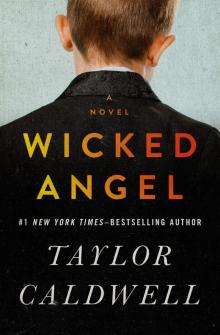 Wicked Angel
Wicked Angel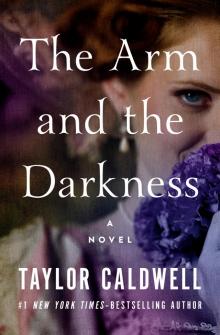 The Arm and the Darkness
The Arm and the Darkness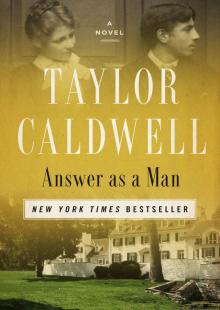 Answer as a Man
Answer as a Man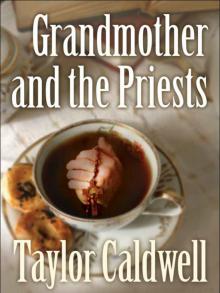 Grandmother and the Priests
Grandmother and the Priests On Growing Up Tough: An Irreverent Memoir
On Growing Up Tough: An Irreverent Memoir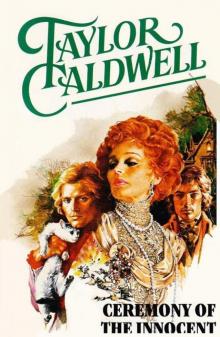 Ceremony of the Innocent
Ceremony of the Innocent The Listener
The Listener Bright Flows the River
Bright Flows the River The Earth Is the Lord's
The Earth Is the Lord's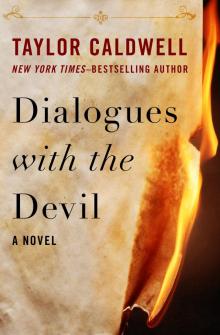 Dialogues With the Devil
Dialogues With the Devil A Tender Victory
A Tender Victory This Side of Innocence
This Side of Innocence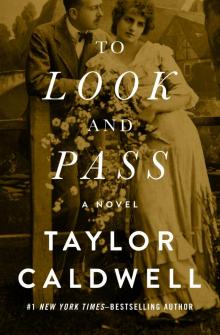 To Look and Pass
To Look and Pass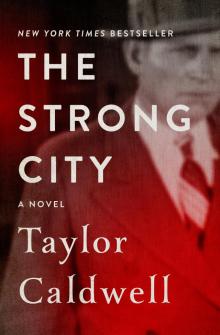 The Strong City
The Strong City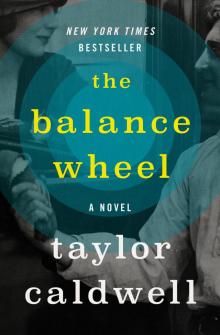 Balance Wheel
Balance Wheel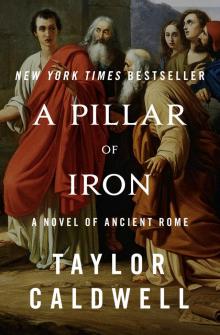 A Pillar of Iron: A Novel of Ancient Rome
A Pillar of Iron: A Novel of Ancient Rome Glory and the Lightning
Glory and the Lightning Dear and Glorious Physician
Dear and Glorious Physician The Wide House
The Wide House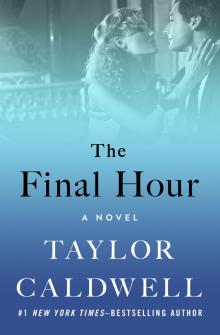 The Final Hour
The Final Hour Never Victorious, Never Defeated
Never Victorious, Never Defeated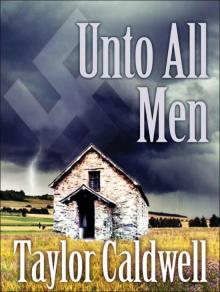 Unto All Men
Unto All Men The Turnbulls
The Turnbulls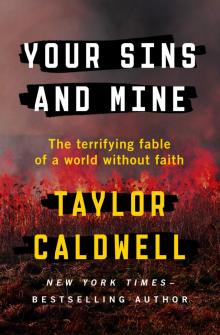 Your Sins and Mine: The Terrifying Fable of a World Without Faith
Your Sins and Mine: The Terrifying Fable of a World Without Faith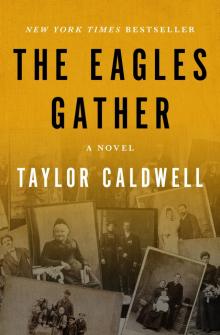 The Eagles Gather
The Eagles Gather Let Love Come Last
Let Love Come Last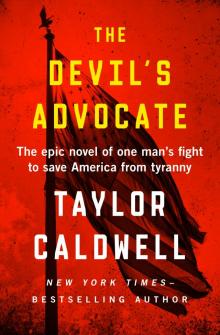 The Devil's Advocate: The Epic Novel of One Man's Fight to Save America From Tyranny
The Devil's Advocate: The Epic Novel of One Man's Fight to Save America From Tyranny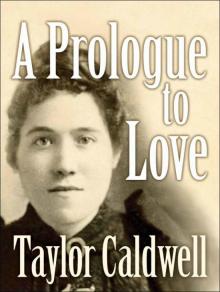 A Prologue to Love
A Prologue to Love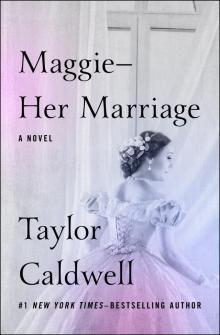 Maggie: Her Marriage
Maggie: Her Marriage The Late Clara Beame
The Late Clara Beame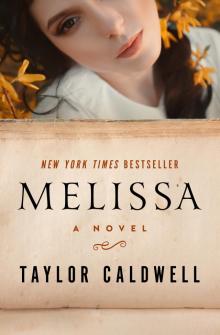 Melissa
Melissa Great Lion of God
Great Lion of God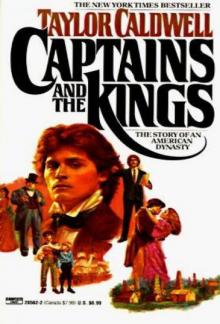 Captains and the Kings
Captains and the Kings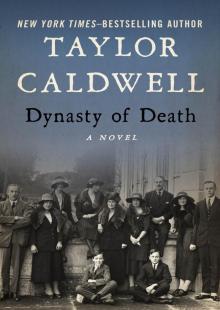 Dynasty of Death
Dynasty of Death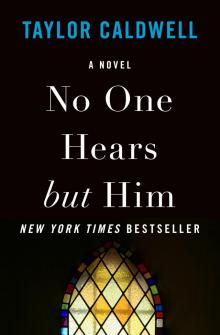 No One Hears but Him
No One Hears but Him The Sound of Thunder
The Sound of Thunder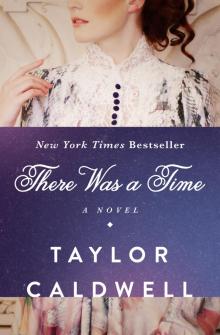 There Was a Time
There Was a Time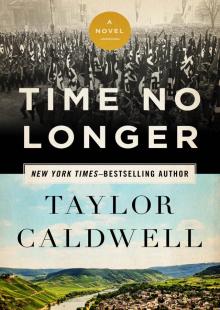 Time No Longer
Time No Longer I, Judas
I, Judas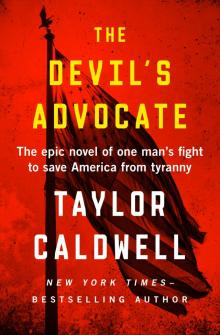 The Devil's Advocate
The Devil's Advocate The Romance of Atlantis
The Romance of Atlantis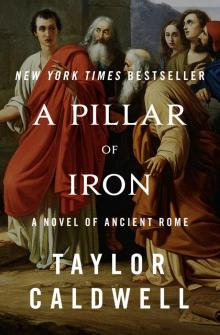 A Pillar of Iron
A Pillar of Iron On Growing Up Tough
On Growing Up Tough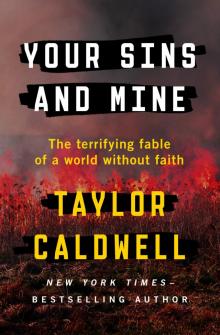 Your Sins and Mine
Your Sins and Mine